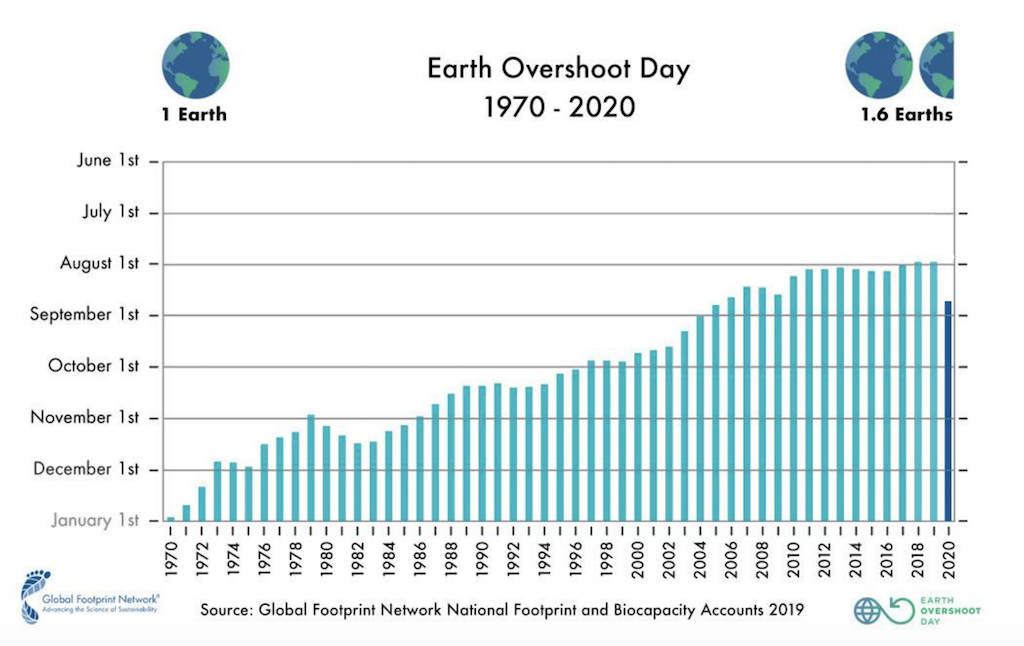3 Mins Read
A new report by the Global Footprint Network has revealed that whilst the coronavirus crisis has led to contraction in humanity’s ecological footprint, the world has still essentially “not moved the date” in terms of the carbon reduction and environmental protection necessary to save the planet. At our current rate, humanity as a whole is still depleting nature 1.6 times faster than our Earth’s ecosystems can regenerate.
In their new report, experts say that the coronavirus pandemic – despite the enormous cost to human lives and the global economy – has led to just a 9.3% reduction of humanity’s ecological footprint from the beginning of 2020 to Earth Overshoot Day, which falls on August 22 this year, compared to the same period last year. Earth Overshoot Day occurs when humanity’s demand on nature goes beyond what the planet’s ecosystems can renew within a year.
The date of this year’s Overshoot marks a mere three-week push back from that of 2019, which came at the cost of pandemic-induced lockdowns around the world, slashing in industrial activities such as fossil fuel combustion and decreases in wood harvest.
“[We] have again used our entire annual natural resource budget several months before December 31,” said the WWF Central and Eastern Europe (WWF CEE) in a press release about the Global Footprint Network’s findings. “We have essentially not moved the date in 2020.”

We have essentially not moved the date in 2020.
WWF CEE
Though the 9.3% reduction in humanity’s ecological footprint is a step in the right direction and marks the biggest ever single-year shift since the Overshoot began in the early 1970s, scientists and conservationists are alarmed that the overall global trend continues to be one that depletes from the Earth. Currently, the world uses up natural capital 1.6 times faster than what our planet can regenerate within a year.
“The sudden ecological footprint contraction is a far cry from the international change which is required to achieve both ecological balance and people’s well-being, two inextricable components of sustainability,” said the Global Footprint Network.
Read: Bill Gates on how the climate crisis will be worse than the coronavirus pandemic
The costs of the world’s ecological overspending will compromise humanity’s resource security, the impacts of which are increasingly being detected in the forms of soil erosion, mass biodiversity loss, global heating and deforestation. A recent study conducted by the Climate Impact Lab revealed that the loss of lives as a result of our ecological degradation could be higher than the deaths as a result of all infectious diseases combined.
The sudden ecological footprint contraction is a far cry from the international change which is required to achieve both ecological balance and people’s well-being, two inextricable components of sustainability.
Global Footprint Network
Solutions to move the Earth Overshoot Day back each year include slashing fossil fuel burning and switching to clean energy solutions, transforming our food system with sustainable food solutions and protecting and conserving the natural habitat. The report highlights that cutting carbon emissions from fossil fuels by 50% would have the impact of moving the Overshoot date by 93 days.
“Humanity has been united by the common experience of the pandemic and shown how intertwined our lives are. At the same time, we cannot ignore the deep unevenness of our experiences nor the social, economic, and political tensions which have been exacerbated by this global disaster,” said Laurel Hanscom, CEO of the Global Footprint Network.
“Making regeneration central to our rebuilding and recovery efforts has the potential to address the imbalances both in human society and in our relationship with the Earth.”
Lead image courtesy of Unsplash.




